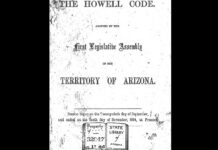
The COVID-19 pandemic forced nearly all government agencies and programs to screech to a halt in 2020.
Criminal courts in Arizona and around the nation were no exception, as they were forced to essentially freeze all active cases and court dates, causing a clog in the legal system.
Rule 8 dictates that a defendant has a right to demand a trial within a certain period of time for certain cases. During the pandemic, however, this rule was revoked temporarily by the U.S. Supreme Court as cases were put on hold over safety concerns regarding COVID-19.
Rule 8 has since been put back into place, but the repercussions of this freeze in the system are now being seen in Yavapai County, as a backlog of more than 1,400 cases has built up over the span of the pandemic.
“There was a natural backlog of cases before COVID, and then COVID hit and it affected not only those cases, but the cases before it,” Yavapai County Chief Deputy Attorney Dennis McGrane said.
The Yavapai County Attorney’s Office has been hiring out help from Maricopa County to deal with this bottleneck of cases, but it simply isn’t enough to fully deal with the caseload. The attorneys involved are taking on two, sometimes three times as many cases as they normally would, according to McGrane.
At a Yavapai County Board of Supervisors meeting held on Oct. 20, Yavapai County Attorney Sheila Polk presented to the board a possible solution to this problem — hire three temporary attorneys to help handle the massive caseload.
The measure to provide funding through the American Rescue Plan Act for this operation was approved unanimously by the board, but there is still a long road ahead before the massive backlog of cases is dealt with fully. During the meeting, Polk said it could take up to three years to recover from the situation.
In the meantime, the reality is that there may be delays in justice for victims, and a possible increased length of stay for people jailed.
“People in custody have a priority over those people who are on release,” McGrane said. “The judges are doing their very best to try as many cases as they can, and we are rising to beat the challenge.”





















